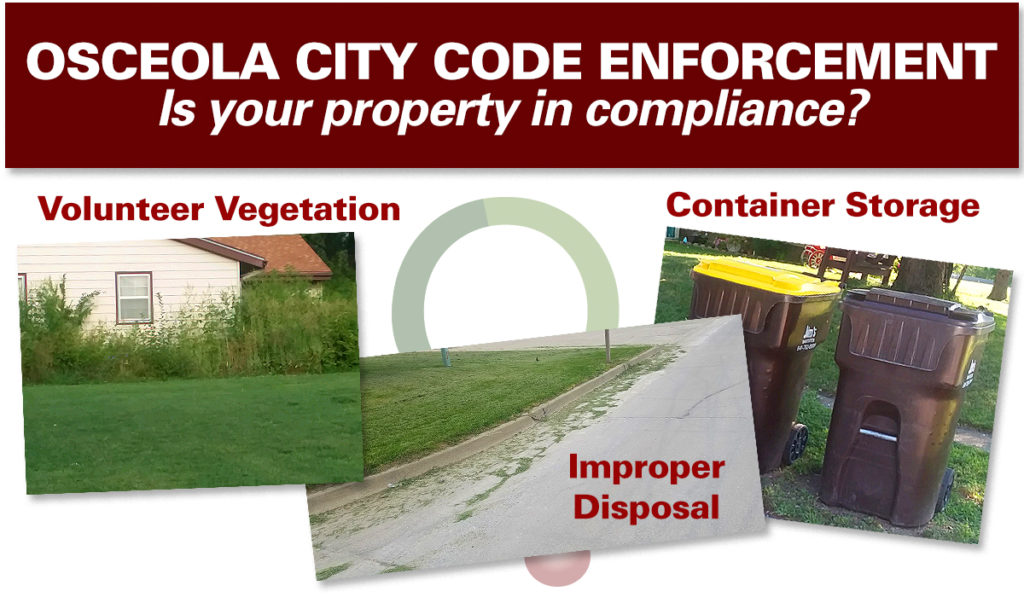If you have tall grass and weeds or other blight on your property that has gotten out of control, the City of Osceola wants to do something about it. In a recent city council meeting, the Mayor and city council members discussed a number of properties that have been deemed “a nuisance” according to City Codes. These properties get flagged by the city for falling into disrepair from lack of upkeep, including mowing, yard care, trash removal, proper container storage and other issues. With a focus on cleaning up these sites and making the community safer, the council is pushing city staff to increase enforcement of the laws around tall grass and excessive vegetation.
Based on the discussions at a recent city council meeting, a majority of the issues center around proper grass and weed control, how yard waste is collected and disposed of, and proper containment and storage, including property waste and recycling bins. The mayor and city council are directing city staff to increase enforcement efforts.
“Historically, the City has always enforced limits on grass height and junk accumulation,” said Ty Wheeler, Osceola City Administrator. “However, in the last few years, the City Council has deemed it necessary to add ordinances regulating excessive volunteer vegetation beyond tall grass, improper storage of solid waste receptacles, and excessive discharge of yard waste onto the City street. These are issues that begin to impact entire neighborhoods if allowed to get out of hand.”
What to look for to avoid being cited or fined:
Excessive vegetation is defined as, “any grasses, weeds, trees, or brush which are voluntary in nature, exceeds a height of 8 inches, and which grows generally against or within fence rows, tree lines, primary or accessory structures, utility poles, mailbox posts, or other similar structures. Excessive vegetation shall not include flower gardens, timber, drainage swales, or any other customary landscaping which may include perennial plantings, ornamental grasses, trees, shrubs, or property currently zoned or in use for agricultural purposes.” Properties in violation of the ordinance will be given a notice to remedy the violation. If the matter is not handled by the deadline given in the notice, the City may hire a contractor to abate the nuisance and the property owner will be held financially responsible.
The city code addressing tall grasses states, “Every owner shall cut, mow and maintain all grass, weeds and brush upon the owner’s property (whether vacated or non-vacated) and adjacent to the curb line or outer boundary of any street, which includes the parking area abutting the owner’s property, any time the vegetation reaches a height of more than 8 inches.” Like the excessive vegetation code, properties in violation of the ordinance will be given a notice to remedy the violation. If the matter is not handled by the deadline given in the notice, the City may hire a contractor to abate the nuisance and the property owner will be held financially responsible.
When addressing the disposal of yard waste or mowing grass, “…it is illegal to deposit grass clippings in the street. Violators shall be fined in the amount of fifty dollars ($50) for all first violations, one hundred dollars ($100) for all second violations and one hundred fifty ($150) for all subsequent violations thereafter.” The City may also charge for any additional clean-up costs.
And finally, pertaining to solid waste and recycling bins, The city code states that it is “…unlawful for any residential solid waste or recycling container to be stored in the public right of way for more than 24 hours after collection has occurred. All residential containers must be stored on private property in a secure location.” Violators shall be fined in the amount of fifty dollars ($50) for all first violations, one hundred dollars ($100) for all second violations and one hundred fifty ($150) for all subsequent violations thereafter.
“With some enforcement and education, City Council hopes the public will begin considering how these issues impact the entire community,” said Wheeler.
To read the city ordinances affecting your property and how you can work with the city to properly maintain your property, go to the city’s Web site at www.OsceolaIA.net and click on the “Ordinances” tab in the main navigation.
